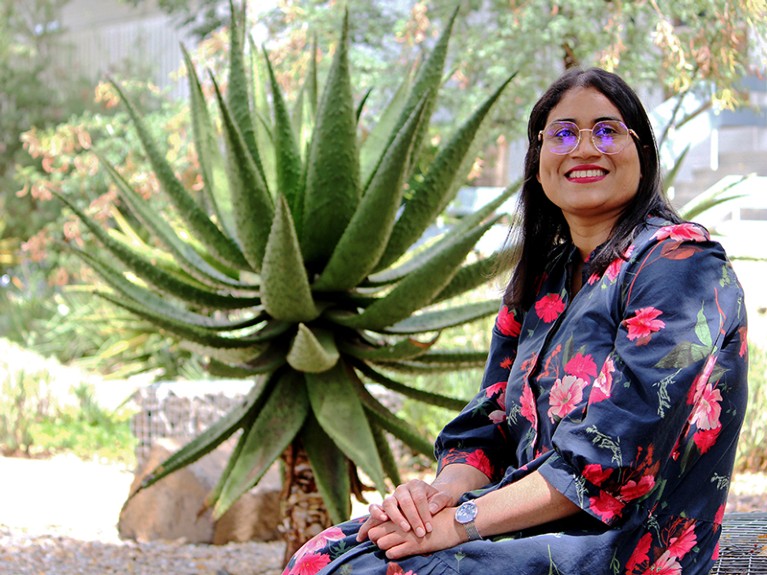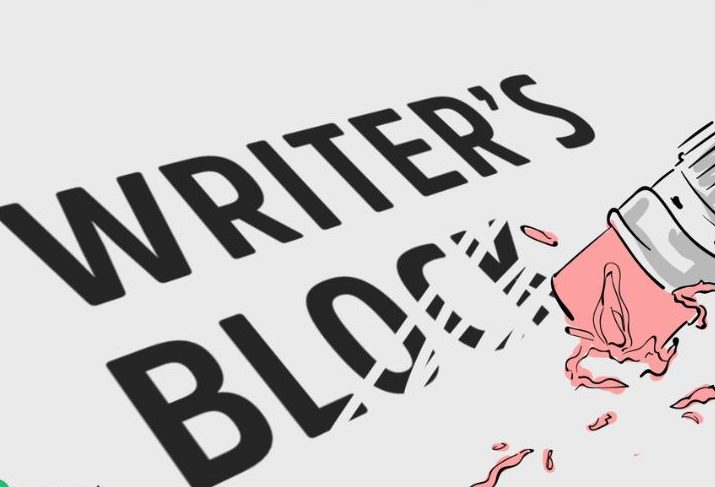[ad_1]

Postdoctoral fellow Kamini Govender developed her own strategies to deal with a low-vision disability and gain work–life balance.Credit: University of the Free State, South Africa
During her PhD in pharmaceutical chemistry at the University of KwaZulu-Natal in eThekwini, South Africa, Kamini Govender helped to develop a greener method for human-insulin biosynthesis in bacteria — one that avoided the toxic solvents typically used1. During the COVID-19 pandemic, she collaborated with South African colleagues at the University of KwaZulu-Natal and the University of Zululand to screen antiviral drugs2 and test the effectiveness of hand sanitizers3. Alongside her educational and scientific goals, she has navigated and conquered many barriers arising from a rare genetic eye condition called retinitis pigmentosa that results in a narrow field of vision.
Now a postdoctoral fellow at the University of the Free State in Bloemfontein, South Africa, Govender investigates biocatalysis pathways that represent a more sustainable, renewable and economical method than routine catalysis. An advocate for equity in science, she tells Nature about some of the challenges she has faced, the stigma she still experiences and the coping mechanisms she has developed for life in the laboratory and beyond.
At what point did you learn about your eye condition?
In grade nine, at the age of 14, I was diagnosed with retinitis pigmentosa, a condition of the retina cells that affects peripheral and night vision. My central vision is OK up to a certain point — up to my nose. If my eye is not directly on an object, I can’t really see it. My peripheral vision is severely constricted. So that’s my challenge.
It hasn’t been easy. It was a struggle to accept the fact that I can’t do certain things that other people can. There is a lot of stigma around being disabled. It took me a while to actually say, at university, that I have this condition. I think I finally accepted the fact that I have low vision towards the end of my PhD.
Collection: Disability and ableism in science careers
Still, sometimes I feel aware of people judging me. When I went to the 72nd Lindau Nobel Laureate Meeting in Germany last June, dedicated to physiology and medicine, I struggled with not wanting to use my white stick. I was self-conscious about it. But if I don’t walk with the stick, I’m very likely to get hurt. So I had to come to terms with using it. I’ve realized that I am a very proud person — so it can be hard to seek help.
How did you manage your condition during your studies?
Throughout my time at the University of KwaZulu-Natal, I tried to compensate for my disability by working longer hours, including weekends or at night. In certain instances, that led to migraines or eye pain. During my undergraduate degree, I did tell the disability unit at the university, and I was given extra time to complete exams. But once I went into my honours, master’s and PhD studies, I needed other types of support, so I developed my own strategies.
What kinds of strategy have you developed?
I use my laptop to zoom in on text when reading papers. But it’s extra challenging. It takes me longer to read: sometimes, I inadvertently skip over words and I have to take breaks to avoid eye strain. I have tried text-to-speech readers, but I find that to be a slow way of consolidating information from peer-reviewed academic papers. Often, I don’t have time to listen to the whole paper. I usually want to be more selective. For tasks such as this, maybe artificial intelligence will be helpful in the future for screening information more quickly.
As for managing lab work, I have found my own coping mechanisms. For example, when doing agarose gel electrophoresis, instead of using a clear casting tray, I use a black casting tray to see contrast better, because my depth perception hinders the loading of the gels. But it still takes me longer than it takes my peers.
When performing lab procedures, I clear my bench, and work with equipment and materials directly in front of me.
Communication barriers for a Deaf PhD student meant risking burnout
Now, doing biocatalysis for my postdoctoral research, I’m working with enzymes. So I’m working with a lot of small tubes that I use for polymerase chain reactions, sampling and gas chromotograpy, as well as doing biotransformations, or transfers between tubes. Before I start, I write down everything I will need in my lab book. I do a lot of planning to set everything up.
Sometimes, when I drop things on the floor, it will take me five minutes to spot a tube, because it’s clear. There are always challenges, but I’ve tried to overcome them.
As a student, I dedicated a lot of energy and felt a lot of pressure to prove myself. I worked very hard and persevered. But that meant that during my PhD at the University of KwaZulu-Natal, my work–life balance suffered. After I finished my doctorate in 2020, I had burnout because I had been pushing myself to finish in three years. I was trying to keep up an unsustainable pace.
How did you recognize this burnout — and reverse it?
From the constant, unrelenting work — long days, including weekends — I had fatigue. I experienced exhaustion. I was tired, and depressed. I had vitamin D deficiency, possibly from spending so much time in the lab that I wasn’t getting enough sunlight.
Insights from four female scientists caught at the early-career crossroads
Over time, I have learnt to practise better self-care by knowing when to stop. I began to exercise and adopted a better diet. I learnt to relax more, by listening to music, walking outdoors and spending time at the beach. I recently started yoga. That’s helped me to calm down and meditate.
I also like cooking. It reminds me of being in the lab, except that you get to eat whatever you cook. The downside — in both cases — is the dishes, which I don’t like!
Is there sufficient support in academia for students with disabilities?
I feel that more needs to be done to include people with disabilities. In the sciences, few of these people make it to the level that I have, because of all the hurdles they come across. It’s easier to quit and give up.
There is a kind of narrow-mindedness. Certainly, in South Africa, and maybe globally, there needs to be more education, awareness, acceptance and empathy around people with disabilities.
There are policies in place for people with disabilities, but in the higher levels of academia, such as in PhD programmes and beyond, there is very little representation. My disability is not something that you can see. So if I don’t tell you about it, you will never know.
I would like to find channels, such as speaking at events to empower women and girls in the sciences, and chairing conference panel sessions to promote inclusivity in science, such as at the World Forum for Women in Science. Those would be good places to start speaking up. I want to encourage other people with disabilities, and girls, to study science.
[ad_2]
Source Article Link





